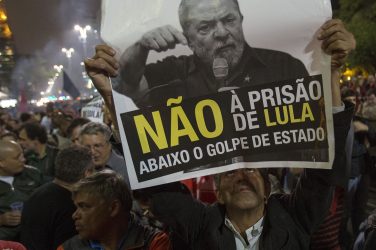The prison massacre in Alcaçuz Penitentiary on January 14, which killed at least 26 people, exposed flaws in the prison system, caused pain, and raised questions to the families of victims.
We heard stories of those who lost their children, husbands, cousins, and friends. An intense pain to be endured by the relatives is the burial of beheaded bodies.
Tired and worn out, housewife Eliene Pereira, 45, from Santa Cruz, a town located about 120 km distant from Natal (capital of Rio Grande do Norte state), had to go to the state capital for three days in a row.
She had to recognize the beheaded body of her 25-year-old son, Diego Felipe Pereira da Silva. She was advised to wait for the search for the head. On Friday, she received a call to communicate a change.
“I went there, when I arrived I’ve recognized the body, because I had seen it only by photos. They took me to the funeral home, opened the bag, then I knew it was him, my boy. Without his head.”
And so she took her son’s body. Eliene Pereira vented: “I wanted to see him, to see his legs, his arms. Even without his head, I wanted to see the reality.”
Because of the advanced state of decomposition, the funeral home advised Eliene Pereira not to arrange a funeral and to bury the body as soon as possible, without saying goodbye, at night, without his family and friends.
Nevertheless, the mother took her child home for the last time. “My son had served a year. He was supposed to get out of jail in March,” she said a week ago. “It’s very hard to bury a beheaded son.”
The wife of detainee M.P.S.N., who died at 22, preferred to preserve her and her husband’s anonymity. She has not seen her husband’s body either, only photos of it.
“I did not want it to be like this, but I think the suffering will be even greater if we do not bury him,” said the prisoner’s wife, who is an undergraduate student.
Her husband had been arrested for two crimes: stealing a motorcycle, under semi-open regime. Then he was arrested again for stealing a cell phone and his sentence was changed to closed regime. He would get out of jail at the end of the year, according to his wife.
“We, his family, had planned everything for when he got out. We had already agreed that he would go back to school. I had already talked to his friends for helping him to get a job,” she noted.
Now the widow says she also faces an uncertain future. “All my plans were to be shared with him.”
In addition to the pain of loss, relatives have all complained of what they called government’s omission, of prison staff allegedly facilitating the attack, and of the harsh society’s judgment.
Many families report that not all the prisoners killed belonged to the Sindicato do Crime do RN (“RN Crime Union”, where RN stands for the state’s initials, Rio Grande do Norte) gang, which controlled the Wing 4 and is a rival gang of the Primeiro Comando da Capital (PCC, the Portuguese acronym for “First Capital Command”).
“Not all prisoners who died were members of this gang. Many of them were only there serving their sentence to get out and fight against this whole system, and try to restore their lives. Because the media do not disclose our information, just what society wants to see.
“Because, for everyone, those who died there were outlaws, criminals. Good criminal is dead criminal. But only if this criminal is not your brother, husband, cousin,” said the wife of M.P.S.N.
Diego Silva’s mother questions the reasons for transferring him to Alcaçuz. He had been arrested for stealing a purse. He served a year in Santa Cruz jail until he was subject to semi-open regime.
He spent three nights sleeping in the detention center. On Wednesday, according to his mother, he said he would stay home to stay close to his family. “After a month, they came in and got him. They threw him in a dangerous place like that, Alcaçuz.” She said her son “never sold drugs, never killed anyone, never joined gangs.”
Diego Silva had warned his mother months ago about that the tense situation in the prison and about the threats from PCC members for invading the building. “He said: ‘Mom, it’s such a mess here, the PCC wants to invade and kill us. Cry for me, because I may not come home alive,'” reports Eliene Pereira.
The Rio Grande do Norte Civil Police investigates how the massacre began, and how prisoners of wing 5 – Rogério Coutinho Madruga prison – got to wing 4. In the families’ view, the government was aware of the impending conflict and had not prevented it.
“The government is certainly held responsible. They were supposed to be safe there. My son went there alive, didn’t he? He had to come back alive. And the government had to guarantee it,” argues Diego Silva’s mother.
Not knowing exactly her rights, but determined to fight for them, Eliene will fight for a compensation. “I lost my son. My son. It’s a piece of me. My son. I have to have rights.”
ABr












